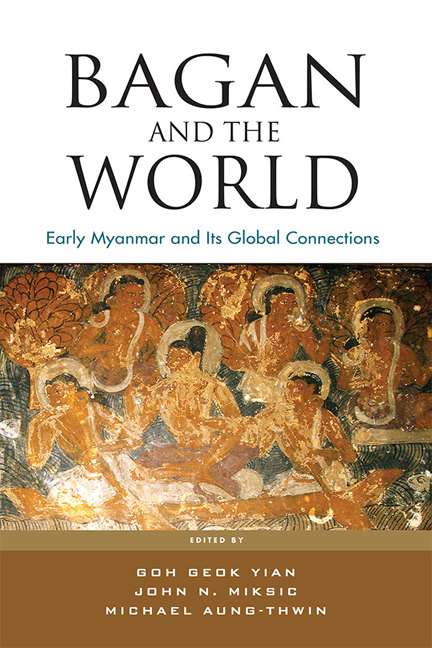Book contents
- Frontmatter
- Contents
- Preface
- Contributors
- 1 Keynote: The Myth of “Splendid Isolation”
- 2 Analysis of Construction Technologies in Pyu Cities and Bagan
- 3 Khraung-kaik Pitaka-taik: 16th-Century Repositories for Buddhist Scriptures in Mrauk-U
- 4 Religious Symbols as Decorations on the Sikhara of Ancient Monuments in the Late Bagan Period
- 5 The Viṣṇu on Garuḍa from the Nat Hlaung Kyaung Temple, Bagan
- 6 A Thousand Years before Bagan: Radiocarbon Dates and Myanmar's Ancient Pyu Cities
- 7 Ta Mok Shwe-Gu-Gyi Temple Kyaukse and Bagan
- 8 Silver Links! Bagan–Bengal and Shadowy Metal Corridors: 9th to 13th Centuries
- 9 Positioning Bagan in the Buddhist Ecumene: Myanmar's Trans-Polity Connections
- 10 Orthogeneity, Settlement Patterns and Earthenware Pottery Distribution in Bagan
- Index
- Miscellaneous Endmatter
9 - Positioning Bagan in the Buddhist Ecumene: Myanmar's Trans-Polity Connections
Published online by Cambridge University Press: 01 February 2018
- Frontmatter
- Contents
- Preface
- Contributors
- 1 Keynote: The Myth of “Splendid Isolation”
- 2 Analysis of Construction Technologies in Pyu Cities and Bagan
- 3 Khraung-kaik Pitaka-taik: 16th-Century Repositories for Buddhist Scriptures in Mrauk-U
- 4 Religious Symbols as Decorations on the Sikhara of Ancient Monuments in the Late Bagan Period
- 5 The Viṣṇu on Garuḍa from the Nat Hlaung Kyaung Temple, Bagan
- 6 A Thousand Years before Bagan: Radiocarbon Dates and Myanmar's Ancient Pyu Cities
- 7 Ta Mok Shwe-Gu-Gyi Temple Kyaukse and Bagan
- 8 Silver Links! Bagan–Bengal and Shadowy Metal Corridors: 9th to 13th Centuries
- 9 Positioning Bagan in the Buddhist Ecumene: Myanmar's Trans-Polity Connections
- 10 Orthogeneity, Settlement Patterns and Earthenware Pottery Distribution in Bagan
- Index
- Miscellaneous Endmatter
Summary
This chapter starts with the assumption that Bagan of the 11th through the 14th centuries was a religious hub for monks and pilgrims and constituted one of three important nodes in a Buddhist common world or commonwealth, or what I have elected to call “Buddhist ecumene”. The Buddhist ecumene demarks a common world within which exchanges and interactions between the different nodes shared a religion: Buddhism. Buddhism represents an overarching principle for all the polities which belonged to the same ecumene, but it is by no means the only linking principle. Within this ecumene, ideas, texts and items travelled and were exchanged among the different nodes of the same network that were also connected via commercial trade. Polities waged wars, sometimes on the pretext of religion, but in other times to obtain more people, more resources and to assert supremacy over another. The ecumene refers to a network of centres which is marked by a common shared religion under the “one house” (oikos) of Buddhism.
Bagan represents one of the three key nodes of this Buddhist ecumene. The Buddhist ecumene begins with the reign of Anawrahta, an 11th-century king of Bagan whose exploits are recorded in the Burmese chronicles of the 18th and 19th centuries, the northern Thai chronicle(s) of the 15th century and the Sri Lankan chronicle, Cūlavaṁsa. The Cūlavaṁsa dates from the 13th century but contains updates through the 19th century. The chronicles present the view that Bagan, northern Thailand and Sri Lanka had close interactions with one another, which began as early as the 11th century. These accounts emphasize the king's importance and the position of the kingdom's capital, Bagan, within the context of a regional Buddhist commonwealth or network, characterized by the idea of a Buddhist ecumene (for detailed discussions, see Goh 2007 and 2014).
Chronicle Accounts
Textual accounts of Anawrahta and Bagan characterize the king making great efforts to obtain Buddhist texts and relics. His endeavours to take religious texts and relics to Bagan resulted in the sending of a number of expeditions to foreign countries such as Tarup-China, Sri Lanka and India. According to the textual accounts, most of these missions were carried out without the outbreak of wars.
- Type
- Chapter
- Information
- Bagan and the WorldEarly Myanmar and Its Global Connections, pp. 179 - 197Publisher: ISEAS–Yusof Ishak InstitutePrint publication year: 2017



